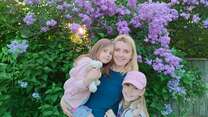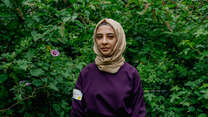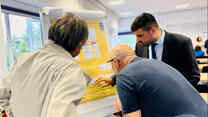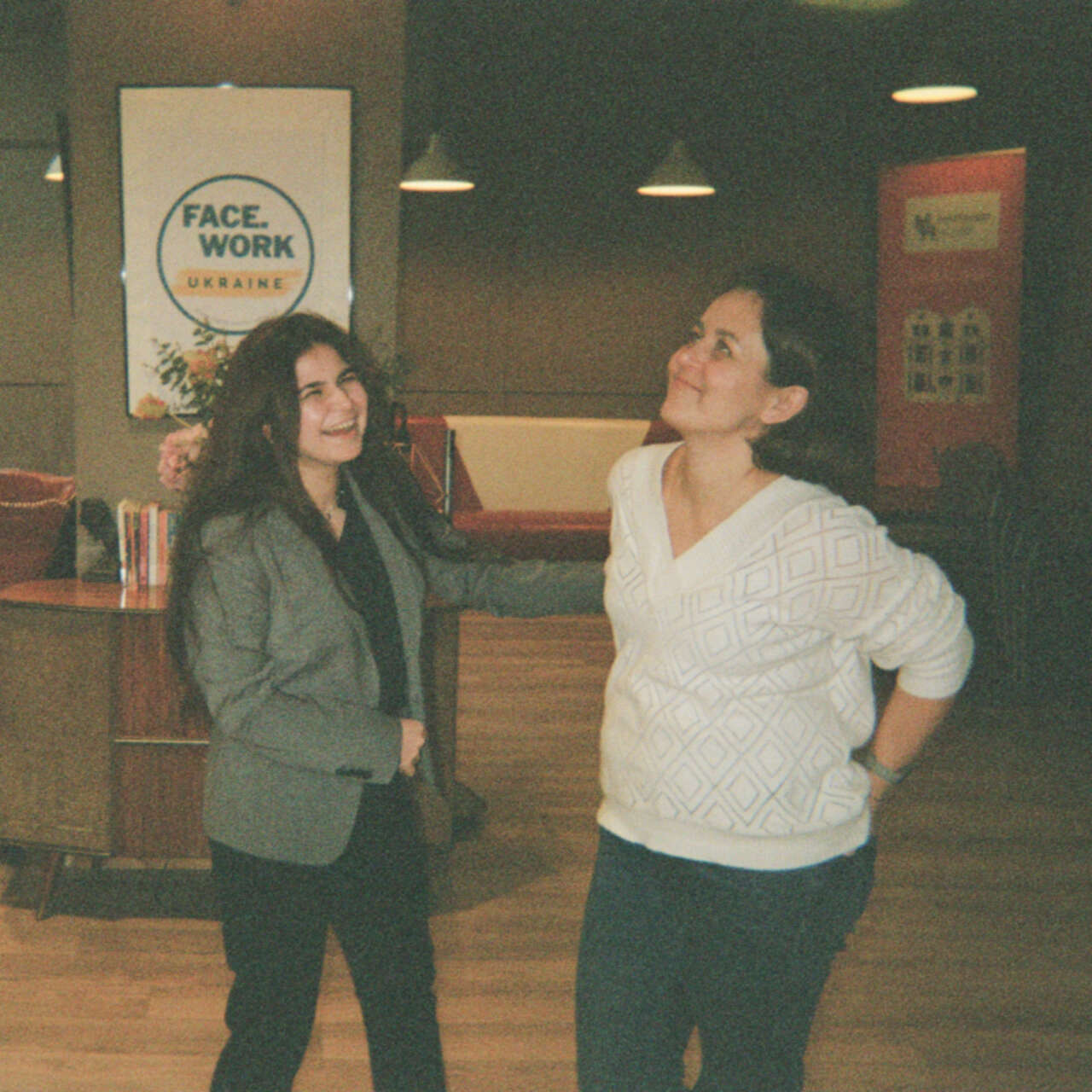
“I'm proud that I have managed to rebuild myself at 45-years-old, because it's very difficult to start again,” Halyna says while sipping a cup of coffee.
Back home in Lviv, Ukraine, Halyna had a successful career as an event manager organising conferences and exhibitions. She loved her life with her husband and their two children. But when the war escalated in February 2022, Halyna was forced to leave her whole life behind to take her son and daughter to safety in London.
Sitting alongside her at a local community hall in south London, is her good friend Masoma, who Halyna met on the International Rescue Committee’s leadership course. Masoma lived in Afghanistan, but despite the women coming from different parts of the world, they share a lot. After working for the British Council for seven years, Masoma also had to leave her home when the government in Afghanistan changed in August 2021.
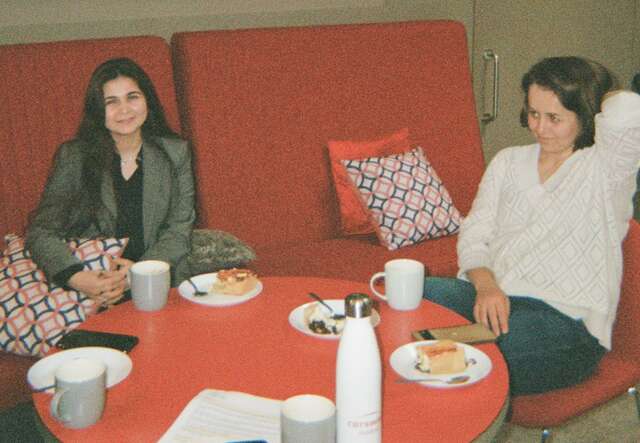
“Because I came to the UK by myself, it was really weird,” Masoma tells Halyna. “It was so stressful, I kept thinking ‘what am I doing here?’. I didn’t know anything about the culture, the society, the people, nothing at all. I just went blank.”
Halyna struggled with the same fears, adding: “Despite Ukraine being closer to Britain, I found a lot of cultural differences and a different mentality. At first it was very difficult to understand people and what they really meant. It's not just about a language barrier, it's also about a lot of cultural things and body language.”
After finding some information about the IRC online, in 2023 Halyna joined the Orientation for Newcomers course which helps refugees navigate British services. Halyna then went on to enrol in the IRC’s leadership course where she and Masoma first met and began supporting one another.
It was so nice because I was in my Ukrainian bubble. But on these courses I was able to meet Syrians, Afghans and other Ukrainians. There were a lot of people on this course and we found so many things that united us. We all have the same experience, the same feelings.
Masoma - who was introduced to the IRC leadership course through her support worker - adds: “And we could learn about our cultures because before that, I didn't know anything about Ukraine. And I could teach everyone about my culture as well.”
One thing that united the women was their ambition to rebuild their careers in the UK. As well as graduating with a degree in English and Literature, Masoma was in her fifth year of medical school with hopes of becoming a cardiologist when she had to move. But while she has completed most of her studies, Masoma is now unable to use these skills in the UK.
“Unfortunately they're not recognising my degree, it's really disappointing,” she explains. “I have contacted universities to see if they can help because it’s my dream to be a doctor and I was almost there, but everything collapsed.”
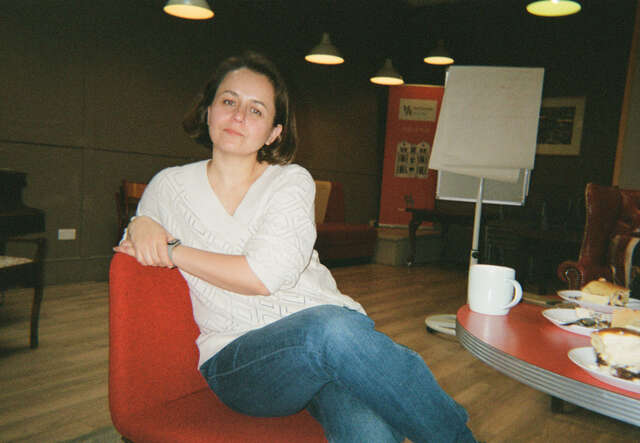
She adds: “I want to continue my studying and I want to reach the goal that I have in my mind. But it's really difficult here. I'm trying but I will not give up, never.”
As Halyna reaches out and comforts Masoma, she tells of her own experience in the UK. While she has two masters degrees and a long career in event management back home, Halyna found it difficult to find a job. After doing some work as a cleaner, she signed up to a service at Lewisham Council where she was given an employment advisor.
“It has been a big problem for Ukrainians to find jobs, it was the language barrier, it was a horrible situation,” Halyna says, adding: “I didn’t understand how the employment system works and who I could ask for help. Even with two master degrees, I couldn’t find work. I didn’t feel like I was fully satisfied and could bring my skills and knowledge to the UK.”
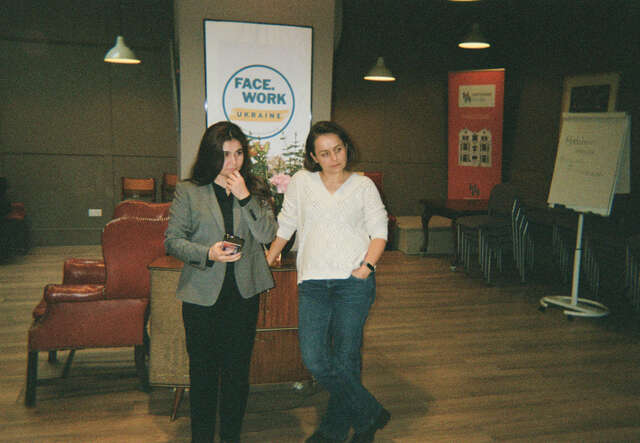
In 2022, Halyna was approached by her employment advisor to help run training for Ukrainians who were also looking for work. After building tailored training programmes with the social enterprise Facework Group CIC, Halyna has now helped over 120 Ukrainians complete the course and find work.
But Halyna created much more than just training, as she was also able to build a community in her local area where Ukrainians support each other both with employment and their mental health.
“We have a lot of Ukrainians who are traumatised because of war and it's not easy to live in another country,” she explains. “So we developed a psychological support group here. We meet every Thursday to talk about our feelings and our emotions.”
Determined to expand this support to more refugees, Masoma joined Halyna to work on a proposal to extend employment training to Afghan and Syrian refugees in the area as well. Excitingly, this was recently accepted by Lewisham council and will be rolled out later this year.
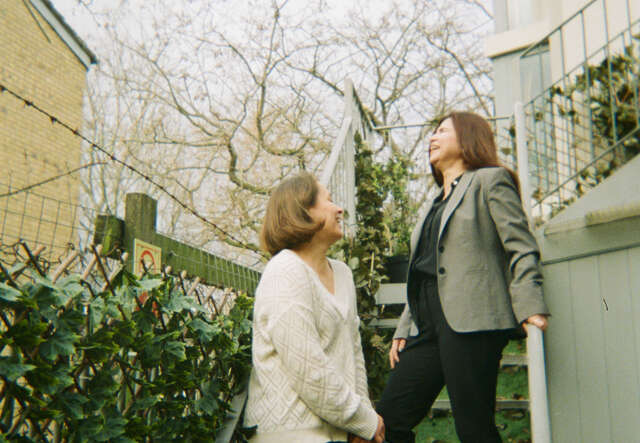
“We can do more. I'm sure we can do more,” Masoma says, adding: “It's not just about me and you, it's about everyone. Britain can use our abilities and our skills. If we can work together, we can have a better future.”
Speaking of their shared experience, Halyna tells her friend: “With both of us coming from refugee backgrounds, and both of us facing all these challenges that others are experiencing now, we can use our experiences and our networks to help.”
As for the future, Masoma hopes she can continue to help other people in her position and has recently joined a project with City of Sanctuary to support refugees in her area. She also wants to support people back home in Afghanistan.
In the UK, firstly I want to support myself, then I want to help others in Afghanistan in their education, especially women. I'm always thinking about what I can do for them and it's really important to me. Because everyone is human and everyone has the right to life. That’s why I joined organisations that are working with refugees.
Halyna adds: “I managed to rebuild myself, and now I want to help others build a career here and find a new way to live in the UK.”
What is the International Rescue Committee?
The International Rescue Committee responds to the world's worst humanitarian crises. We help to restore health, safety, education, economic wellbeing and power to people devastated by conflict and disaster. And we are proud to fight for a world where women and girls have an equal chance to succeed.
Read more about the International Rescue Committee in the UK

